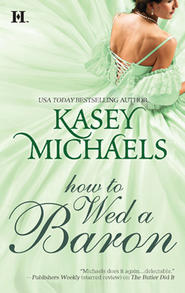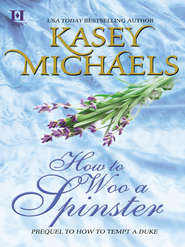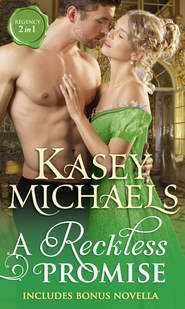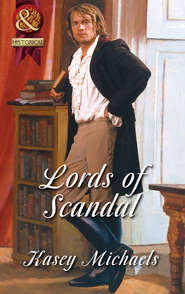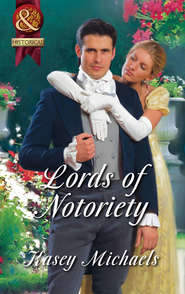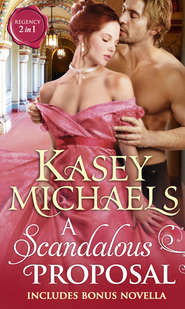По всем вопросам обращайтесь на: info@litportal.ru
(©) 2003-2024.
✖
The Bride of the Unicorn
Настройки чтения
Размер шрифта
Высота строк
Поля
After all, if the duke lost his devotion to religion, his only talisman in a world gone mad, there would be nothing left for him to live for. and Morgan would soon after be forced to make that solitary journey back from the mausoleum.
Now, unfashionably early in the morning the day after Lord James’s funeral, as the marquis alighted from his mount at the gates to the orphanage, gates that hung drunkenly from leather straps stretched long past their best effectiveness, he dismissed depressing thoughts of his father and of the lack of one single person in the world to whom he could confide his deepest hopes and thoughts. Instead, Morgan wondered silently if he had ever stolen food from the mouths of any of the foundlings, who must have viewed a ripe red apple as a prize beyond price.
But he didn’t wonder for long. There was no sense in condemning himself for the follies of his misspent youth, for he had long since outgrown them for the follies he had indulged himself in since becoming—in the eyes of the world, at least—a man grown.
He approached the gates purposefully, refusing to regard what he was doing as anything more than hunting mares’ nests because of a dying man’s insane blatherings, and pulled on the rope that set a bell to sounding tinnily on the other side of the wall. And then he waited, slowly realizing that, although there had to be at least thirty orphans in residence, he had not heard a single sound since the bell stopped ringing. Not a laugh. Not a cry. Nothing. He might as well have been standing outside a graveyard.
“Well, lookee here. Glory be ta God, and ain’t ye a fine-lookin’ creature ta see so early in the mornin’? And rigged out just loik a Lunnon gennelmun with it all, ain’t ye?”
Morgan turned about slowly to see a small, slight woman well past her youth—and most definitely years beyond any lingering hint of beauty she might ever have possessed—standing just behind him, a large bundle of freshly cut, still damp rushes tucked beneath her left arm.
He removed his curly-brimmed beaver and swept the woman an elegant leg, the distasteful aroma of unwashed female flesh assaulting his nostrils. “Good day, madam,” he said politely as he straightened, suppressing an urge to take out his scented handkerchief and press it to his nostrils. “Allow me to introduce myself. I am the Marquis of Clayton, here to see the person in charge of this charming institution.”
The small woman cackled—like an ancient hen with a sore throat, Morgan thought—then smiled, exposing her sad lack of teeth. She had some, for certain, but they were stuck into her gums at irregular intervals, as if she had stood at some distance while Mother Nature tossed them at her one by one, and she’d had to open her mouth to catch them as best she could.
“Mrs. Rivers? And what would ye be wantin’ with the likes of her, boyo? Drunk as a wheelbarrow the besom is, and has been ever since the quarter’s funds showed up here a fortnight ago, don’t ye know. Bring yerself back next month, when she’s murdered all the gin and can see ye straight. She’s always been one fer a well-turned leg.”
“I’m afraid my business can’t wait that long,” Morgan said as the woman moved to brush past him as if he—and his impressive title—didn’t exist. She was the rudest individual he had ever met—and yet she intrigued him. She had a look of cunning intelligence about her, well hidden by the grime on her face, but still noticeable.
He decided to give it another try. He’d use the name his uncle had not given him, a name he already knew. “I’ve come with a mission—to locate a child, a young lady by now, I suppose. Her name is Caroline. Blond hair, or at least it was when she was little. She would be about eighteen.”
The woman stopped abruptly, looking back at him slyly across one bony shoulder. “And is that a fact, boyo? And what, I’m askin’, would a fine upstandin’ gentrymort like yerself be doin’ pokin’ about for Caroline? Plenty of willin’ bodies at the Spotted Pony—iffen ye don’t mind a dose of the clap. Go there, why don’t ye? I’m past such tumblin’s now, even with a pretty un like yerself.”
Until the woman spoke the name aloud as if familiar with it, Morgan had been willing to believe that his uncle’s story was just as he had presented it—a fairy tale meant to send his nephew off to chase his own tail. Until this very moment he had refused to believe there was a grain of truth in James Blakely’s words, or a single reason to hope that he, Morgan Blakely, had at last found a fitting instrument of revenge against his enemy.
“Surely you jest. You are the very picture of feminine beauty. What’s your name, madam?” he asked now, extracting a single gold piece from his pocket and offering it to her.
“And that’s a golden tongue ye have, don’t ye, boyo? My name is Mary Magdalene O’Hanlan, seein’ as how ye asked so nice like, but I’ve been Peaches since m’salad days in Dublin and then in Piccadilly.” The woman smiled, then quickly snatched the coin from his fingers, biting on it to ascertain whether or not it was real before stuffing it inside the low bodice of her filthy gown. “M’cronies dubbed me with the name ’cause I was so good at stealin’ sweet things from the stalls. I was the best—once. But that’s a long time past, and best forgotten.”
Her smile vanished as she leveled narrowed eyes at Morgan. “Now take yerself off, pretty boy. I ain’t got nothin’ more ta say. Just like I told that other fella all those years back—a mean-lookin’ mort with a smile that wide, but that still couldn’t hide the old divil what was peekin’ out between his two eyes—there ain’t no Caroline here. Not no more.”
Morgan shook his head, disgusted with himself that he should feel so discouraged. He should have known. “She’s dead, then?”
Peaches cocked her head to one side, blowing a greasy lock of graying red hair out of her eyes. “And did ye hear that from me? Ye got a mind what leaps ahead fast as a horse can trot. Mayhap she is, boyo, and mayhap she ain’t. It depends, don’t ye know. What would the loiks of ye be wantin’ with Caroline Monday anyhows?”
“Caroline Monday?” Morgan repeated the name questioningly. “Then this particular orphan we’re speaking of has a surname—a last name? Perhaps she isn’t the one I’m seeking after all.”
Peaches snorted. “Don’t know a lot, do ye, boyo? It’s me what named her Monday. That’s the day I found the creature on the doorstep, just like I find so many of ’em, cryin’ her little heart out fer her ma. She told me her other name all by herself,” she continued, smiling reminiscently. “No higher than m’knee, she was, but she told me her name plain. Just afore she bit m’hand as I was offerin’ it ta her. The divil’s own rogue, she was, and no mistake. Then she caught the fever, like so many of them do, and I wouldna gived a plugged pennypiece fer her. But she didn’t cock up her toes, not that un, even if she was poorly for ever so long. Too stubborn ta know she should be dyin’, I said then ta anyone who’d listen, and I say it again now. Too simple mean stubborn by half! Think she was the bloody queen o’ England herself!”
Morgan was elated by this information, but he deliberately tamped down his enthusiasm, saying only, “Yet you told me, as you told this other man you spoke of, that Miss Caroline is gone.”
Peaches allowed the bundle of rushes to fall to the ground. “Miss Caroline, is it, now? And don’t that sound grand fer a foundlin’ brat?” She peered at him again, as if assessing him for flaws. “Now I’m thinkin’ mayhap it’s time some more of your worship’s lovely gold passed over Miss Mary Magdalene O’Hanlan’s palm?”
“Perhaps,” Morgan replied tightly, and then for the first time spoke aloud of the memory his uncle’s patently false, contrived confession had brought crashing to the forefront of his mind. “Or perhaps it’s time I rode to the village to summon the constable, so that you can tell him that Mary Magdalene O’Hanlan is a member of the gang of nefarious and long-sought kidnappers of one Lady Caroline Wilburton, daughter of the earl and countess of Witham, who were cruelly murdered on a roadway not thirty miles from here some fifteen years ago?”
Peaches plunked herself down atop the bundle of rushes, her skinny calves sticking out from beneath the hem of her gown. “The divil you say, boyo,” she responded as she looked up at him, her voice tinged with wondrous awe but not a trace of fear or guilt. “And would ye be knowin’ if there’s a reward in the offin’ for the safe return of this poor little darlin’? After all is said and done, it’s me what kept her little heart beatin’—what with m’lovin’ good care of the tot, don’t ye know.”
Morgan knew he could either dole out a coin for each piece of information or shorten the process by some minutes by acknowledging how important the woman’s answers were to him. Deciding to leave subterfuge for another day and for someone less sharp than Peaches O’Hanlan, he pulled a small leather purse from his pocket and dropped it in the Irishwoman’s lap. “Where is she?”
The purse followed the gold coin before Peaches answered him. “That’s what I like, boyo—a fella who comes right to the heart of the thing. She’s not here, nor has she been in this stinkin’ hole fer this year or more. But I knows where she be, and it’s more than a good ride from here. Ye’ll be needin’ me ta get ta her, don’t ye know. Needin’ me to point her out ta ye, ta get her ta trust ye. And it’s the only real mither she’s ever known or remembered since the fever struck that I am, the only one she loves. I’m her dearest Peaches, that’s what I am.”
“How commendable of you. You’ll be well rewarded if you continue to cooperate. That purse is only a pittance, one that could be trebled. Gather whatever belongings you have and meet me outside these gates in an hour. I’ll return with my carriage.”
Morgan felt very tired as he turned to mount his horse. What was he doing? The Irishwoman could be lying to him. His uncle James most probably had been lying to him. And yet some of the puzzle pieces were already beginning to fit. He had to continue the search for his instrument of revenge against Richard Wilburton. He had been patient for three long years. It was time to act. “An hour, Miss O’Hanlan, and no more. And don’t breathe a word to anyone.”
“Me?” Peaches responded, scrambling to her feet. “It’s close as an oyster I’ll be, and ye can take that as m’word.”
“I’d prefer not to take either your word or your person anywhere, Miss O’Hanlan, but as you Irish say, ‘Needs must when the devil drives’.”
Morgan swung himself up into the saddle. “Oh, and one more thing. Kindly bathe before I come back. You reek of the sewers, Miss O’Hanlan.”
Peaches gave a flirtatious flip of her bony hand as Morgan guided his horse toward the path. “Dip m’self in parson’s ale? Well, all right—but only a little bit, and only ’cause ye’re a such pretty thing, boyo.”
CHAPTER THREE
Beware, as long as you live, of judging people by appearances.
Jean de La Fontaine
“DULCINEA? DULCINEA! You sweet, wretched angel, I see you skulking out there. Come in here to me at once! I have just now had the most splendiferous notion!”
Caroline Monday lifted her small chin from her chest, where she had let it drop while she indulged herself in a moment of exhaustion not unlike all her waking moments, and tiredly hauled herself up from the slatted wooden bench pressed against the wall of the hallway outside one of the small rooms reserved for affluent patients.
“Aunt Leticia, all of your notions are splendiferous,” she soothed kindly as she walked toward the open doorway, “and as you have these notions at least three times daily, I see no need to rush lickety-split to hear the latest one.”
“Oh, pooh,” Leticia Twittingdon, who would never see the sunny side of fifty again, complained from her cross-legged perch on the wide cushioned window seat, thrusting her lower lip forward in a pout as Caroline entered the room. Miss Twittingdon’s long, angular body was dressed from head to toe in brightest scarlet, and a crimson silk turban perched primly on her childlike curls. “And I was so certain you’d want to have me teach you the names and various titles of all of good King George’s royal princes and princesses. All accomplished young ladies should know these things by rote, Dulcinea. It isn’t enough merely to be beautiful. We must complete your education. Let’s see, is Princess Amelia still alive? I seem to remember some tragedy about that dear little thing.”
Caroline bent to pick up Miss Twittingdon’s wool shawl, which had somehow found its way to the threadbare carpet, and laid it over the back of a wooden chair. “Another time, dear lady,” she said, smiling wanly as she pushed her palms against her arched back at the waist, trying to ease her aching muscles. She was so tired. But then, she was always tired. “This particular well-informed debutante is woefully late emptying the chamber pots today.”
“Dulcinea! How many times must I remind you that genteel ladies such as yourself do not speak of such base mortal necessities? Chamber pots, indeed! Don Quixote de la Mancha, that dearest and bravest of knights—a veritable saint!—would have deemed them golden chalices. Oh, dear. Should I have said that? Have I been sacrilegious?”
“I really wouldn’t know. If I understand the meaning of the word correctly as you have taught it to me, life itself is sacrilegious. Perhaps you should call me Aldonza, as in Mr. Cervantes’s book?”
“Never!” Miss Twittingdon lifted one index finger and jabbed it into the air, as if to punctuate her denial. “I may not be a man, and thus forbidden the splendiferous adventures of Don Quixote de la Mancha, but I will not be denied my Dulcinea!”
“Of course you will not be denied her. Please forgive me, Aunt Leticia. I must be overtired to have forgotten my high station so far as to mention the pots. I spent most of the morning peeling potatoes in the kitchens and half the afternoon on the public side attempting to convince Mr. Jenkins of the folly inherent in his wish to bite off Mr. Easton’s left ear as he held the little fellow tight in a stranglehold.”
Miss Twittingdon shivered delicately as she leaned forward, her long, needle-sharp nose all but twitching, to hear the latest gossip. “The horror of it! And did you succeed?”
“I’m not quite sure,” Caroline told her before sinking into the chair and leaning back against the shawl, which smelled of dust and the old lady’s rose water. “Mr. Jenkins ended by biting off the bottom half of Mr. Easton’s right ear—although Mr. Easton didn’t appear to mind. But then, Mr. Easton doesn’t mind much of anything, not even his lice. Tell me, should I consider a change of ears a success?”
Leticia tipped her head to one side, pressing a finger to her thin lips. “I shall have to ponder that a moment…. No, I don’t believe so, Dulcinea. I thought you told me that Mr. Jenkins confined himself to the occasional proboscis. But truthfully, my dear, I don’t know why you bother going over to the public side at all.” She lowered her voice conspiratorially as she added in a near whisper, “A lady shouldn’t say this, I suppose, but they’re all as mad as bedlamites over there, you know. As mad as bedlamites.”
Caroline turned her head away from Miss Twittingdon who, after five years in the private side of the asylum, had yet to recognize that she, too, was an inmate and not a pampered visitor. Perhaps if she visited the public side she might begin to understand the precariousness of her position, for if her brother—“the Infernal Laurence”—ever chose to stop sending quarterly payments to the proprietors of the asylum, Leticia would soon find herself in one of those narrow, unheated cells. But then, what good would frightening such a dear, harmless old lady do?
The only wonder was why she, Caroline Monday, hadn’t been reduced to madness herself in the year she had worked as a servant of all work at the Woodwere Asylum for Lunatics and Incorrigibles. From her first day there, when one of the inmates had flung his own excrement at her, Caroline had known that her move from the Glynde orphanage had provided no great stepping stone up to a better life.
But Caroline had survived.






